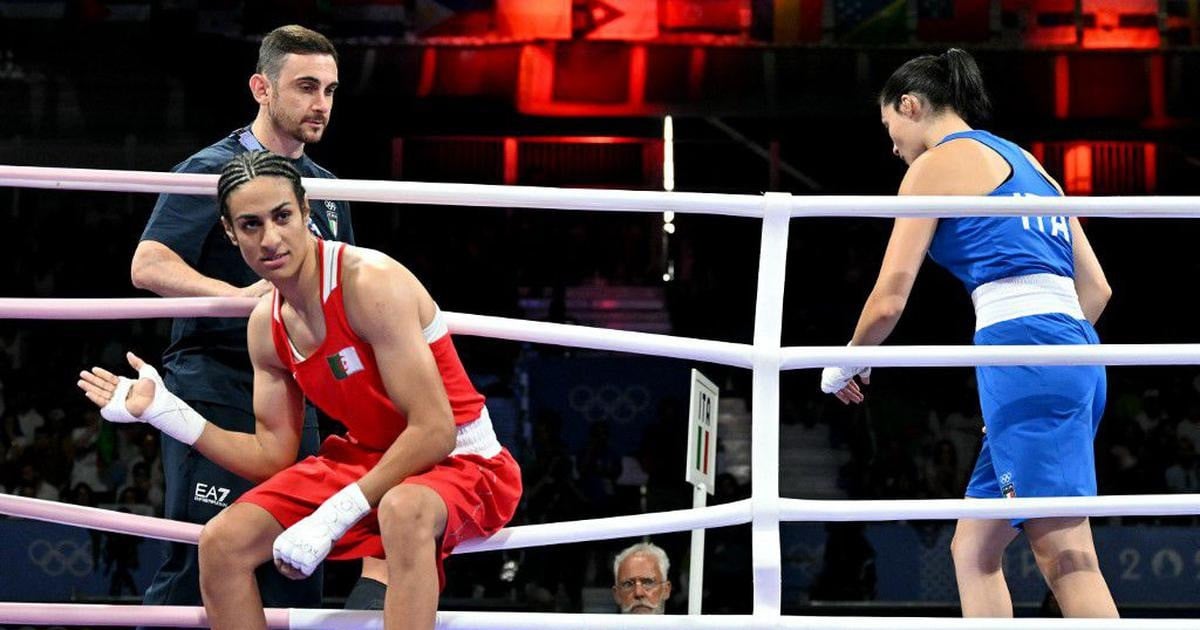An Olympic women’s boxing match, along with misinformation about one of the athletes, has recently been leveraged by conservatives to promote their anti-trans agenda.
On Thursday, Algerian boxer Imane Khelif competed against Italian boxer Angela Carini, winning in just 46 seconds after Carini abruptly withdrew from the fight.
Carini, visibly upset, declined to shake Khelif’s hand and told reporters she pulled out due to pain from an initial punch. “I ended the match because after the second blow,” Carini said, “I felt a strong pain in my nose.”
This reaction has led to scrutiny of Khelif, who was assigned female at birth and identifies as a woman. False claims have circulated, suggesting she is transgender or that she is a man pretending to be a woman.
These rumors gained traction partly because of reports about Khelif’s disqualification from a 2023 International Boxing Association (IBA) event and comments from the IBA president suggesting her elimination was due to a failed hormone test.
Prominent anti-trans figures, such as author J.K. Rowling and politicians including U.S. Republican vice presidential nominee J.D. Vance and Italian Prime Minister Giorgia Meloni, have amplified these inaccurate statements.
Their remarks have ignited a backlash on the right, despite the fact that Khelif is a cisgender woman.
As Vox’s Alex Abad-Santos has pointed out, there are no transgender athletes competing in the Olympics this year outside of their assigned sex at birth.
Although the International Olympic Committee (IOC) allows transgender athletes to compete if they meet specific eligibility criteria, IOC spokesperson Mark Adams emphasized, “The question you have to ask yourself is, are these athletes women? The answer is yes.”
In the 2024 Olympics, Khelif and Carini faced off in their first bouts. Olympic boxing matches are organized by weight class and operate on a knockout basis, with the winner advancing and the loser being eliminated.
Both athletes had previously competed in the Tokyo Olympics, with Carini being eliminated in her first bout and Khelif in her second.
During their match, Carini initially engaged with Khelif, but after pausing to adjust her headgear, Khelif landed a significant punch.
Carini, clutching her nose, then withdrew from the match, which is unusual as most boxing matches include three rounds. Carini expressed dissatisfaction, stating “It’s not fair,” and refused Khelif’s attempts at a handshake.
The controversy surrounding the match has been compounded by events from over a year ago. In 2023, Khelif and Taiwanese boxer Lin Yu-ting were disqualified from the IBA World Championships in New Delhi.

Reports suggested this was due to increased testosterone levels, and the IBA’s president reportedly mentioned that both athletes had “XY chromosomes,” typically associated with those assigned male at birth.
The IBA did not provide clear documentation or details about the tests conducted, and questions arose since Khelif was disqualified only after defeating a Russian boxer.
Recently, the IBA stated that Khelif and Lin did not undergo a testosterone examination but were subject to a confidential test, which indicated they had competitive advantages. Both athletes had previously competed in the 2022 World Championships, also organized by the IBA.
The IOC criticized the IBA’s 2023 decision as “arbitrary” and lacking transparency. Both Khelif and Lin competed in the 2021 Olympics without issue, and neither medaled. The IOC has deemed the IBA an unreliable regulator due to concerns about financial dealings, leadership, and match-fixing allegations.
The ambiguity surrounding the 2023 disqualifications has fueled misinformation about Khelif. However, the IOC’s rules, which do not include sex testing and have been scrutinized for flawed science, remain clear.
The IOC disqualifies athletes with Differences of Sexual Development (DSD) based on safety and fairness considerations, not sex testing.
Additionally, racial dynamics are at play in the perceptions of this match. Female athletes of color, particularly those of African or African American descent, have historically faced accusations of being men when they outperform white competitors. Notable examples include Serena Williams and Caster Semenya, who have faced similar tropes.
Following the match, Carini has expressed a desire to apologize to Khelif, stating, “If the I.O.C. said she can fight, I respect that decision.”
Other boxers have indicated they are not concerned about competing against Khelif. Hungarian boxer Anna Luca Hamori, who will face Khelif next, said, “I don’t care about the press story and social media.” Lin’s first match proceeded as planned, and like Khelif, she won.
Despite the facts of Khelif’s Olympic experience, the false narrative surrounding her victory has been exploited by those with anti-trans views to advance their agenda.
Rowling and other anti-trans figures, including Tesla CEO Elon Musk, have used the match to argue against gender diversity in sports. “We object because we saw a male punching a female,” Rowling wrote on X.
U.S. conservatives have similarly used the match to push anti-trans rhetoric, with figures like Vance wrongly linking the fight to Vice President Kamala Harris and former President Donald Trump advocating to “keep men out of women’s sports.”
Such rhetoric is part of a broader anti-trans legislative effort focused on issues like bathroom access, women’s sports, and gender-affirming care for minors.
These bills frame trans people as threats and aim to mobilize conservative voters, particularly those motivated by religious or ideological beliefs about gender.


